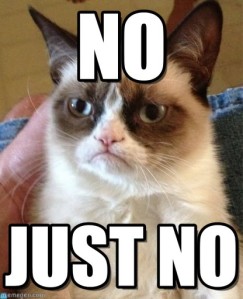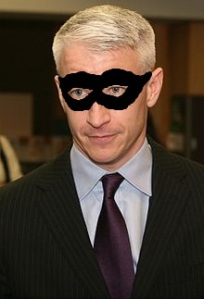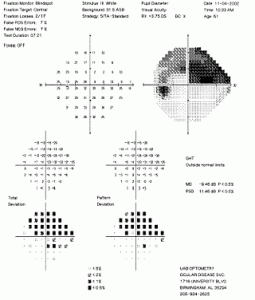“I was legally blind before I had LASIK.”
“I can see ten miles away with my glasses on, but without them I’m legally blind.”
“My vision is great; I don’t need glasses or contacts. But you should see my wife’s thick glasses; she must be legally blind!”
NO.
NO NO NO.
Now, I don’t want to sound belligerent, but we really need to have a dialogue about the definition of “legal blindness.” Its misuse is something that really shouldn’t make me angry, but lately it’s been grinding my gears a little bit. I know, I know; there are better things to be miffed about – the Middle East is still in turmoil, unemployment numbers in the U.S. are still not great, they took away the McRib again – but gosh darn it, the record needs to be set straight. So I’m sorry for my ill-masked disgruntledness. Hopefully by the end of this post I’ll feel more gruntled.
Before we get into the real educational portion of this post, let me first attempt to justify or at least explain my anger (which by the way isn’t really anger, but more like anger’s little brother; I’d like to think that I never get truly angry about anything, except maybe when contestants on Wheel of Fortune buy vowels when they obviously already know that the vowel they’re buying is in the place they expect it to be – like “Well Pat, that word is three letters and starts with a T and an H, I’d like to buy an E.” Those vowels cost you money, dummy! I don’t care if there might be other E’s in the puzzle; it’s the principle of the thing.).
Anyway, my mini-anger. It’s just that I have yet to hear a single person in casual conversation use the term “legal blindness” correctly. Heck, I probably did the same thing before I went to optometry school. But now that I have a blog and a few people actually read it, I’m going to use this chance to give people the knowledge that I never received as a youngster. Frankly, I’m tired of cringing every time I hear one of the statements that I put at the beginning of this post. I guess you could call it a pet peeve. If you’re a patient of mine and you’re guilty of this and have said it in front of me, I hope I concealed my inner pain well enough (just kidding; you know I love you).
On to the definition. The United States government defines “legal blindness” as a visual acuity of 20/200 or worse in the better seeing eye, with best correction, or less than 20 degrees of visual field irrespective of visual acuity. If you need a refresher on how visual acuity works, click here.
Let’s break this down.
Possibly the most important phrase in that definition is “with best correction.” What does this mean? Glasses and contact lenses qualify as vision correction, so your best vision with your glasses or contacts would be your “best correction.” Thus, the statement “I’m legally blind without my glasses” makes no sense, because in order to meet the definition of legal blindness, you have to have poor vision (i.e. worse than 20/200) WITH YOUR GLASSES OR CONTACTS.
To use myself as an example, with my glasses on, I can see 20/20 on a standard visual acuity chart. Without my glasses, I can see about 20/800 (essentially I can see blobs of color. For reference, look at a Monet painting). Despite my awful vision without my glasses on, I am not legally blind. If you have a driver’s license, you are not legally blind.
That’s the long and short of it. If you feel absolutely inclined to portray to another individual just how poor your eyesight is, may I suggest the phrase “figuratively blind?” It may not roll off the tongue as nicely, but it’s much more accurate.
Thanks for reading! I’d continue, but I have an anger management class to attend.









